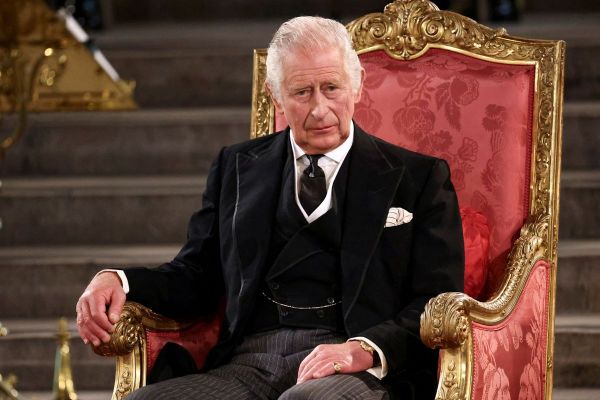The state visit of King Charles III to France has been postponed at the request of French President Emmanuel Macron, according to Downing Street.
After unions planned for a day of pension protests during the visit, the president stated, “we would be irrational and lack common sense” to proceed.
The journey to Paris and Bordeaux was originally scheduled to commence on Sunday.
But, violence broke out in both towns on Thursday, the worst since demonstrations began in January.
Buckingham Palace stated that the decision to postpone Charles III and Camilla’s three-day vacation to France was due to the “situation in France.”
The statement said,
“Their Majesties eagerly anticipate the opportunity to visit France as soon as dates can be determined.”
As of Thursday evening, when unions planned a tenth national day of strike for Tuesday, two days into the state visit, President Macron deemed it improper for the King and Camilla to go.
“Since our relationship with His Majesty, the Queen, and the British people is one of great affection, respect, and admiration, I took the initiative this morning to phone [the King] and explain the circumstances… Friendship and common sense drove us to propose a postponement.”
The British government said that the decision was “made with the agreement of all parties.” Mr. Macron stated that France has offered to reschedule the trip for early summer “when things have calmed down”
The decision is a major loss of face for France and President Macron. This was intended to be a showcase for France, introducing the new monarch to the finest aspects of French culture and fostering a freshly rekindled bond.
Left and right-wing opponents of the president reacted swiftly.
Eric Ciotti of the Republicans stated that the cancellation brought “shame on our country,” whereas Jean-Luc Mélenchon of the extreme left was ecstatic that the “meeting of kings at Versailles” had been canceled, adding that “the English” were aware that France’s interior minister was “pathetic on security.”
The demonstrations had rendered the trip difficult. Some French cities witnessed violence on the periphery of the generally peaceful marches that drew over a million people on Thursday.
The entryway to the Bordeaux city hall was set on fire. In Paris, tear gas was shot, and according to Interior Minister Gérald Darmanin, 903 fires were started in a city where garbage has not been collected since March 6.
Hundreds of police officers were injured around France, but protestors were injured by stun grenades, and the Council of Europe stated that “excessive force” by authorities was unjustified.
French officials spent much of Friday morning reassuring the public that the state visit scheduled for 26-29 March will occur and that security measures were in place. Some British journalists were already in Paris covering the event.
This was a very significant journey for the King, as it was his first state visit to one of the United Kingdom’s closest and longest allies. King Charles and Camilla were scheduled to ride along the Champs-Élysées in the heart of Paris and dine with President Macron at Versailles.
Camilla was due to open an art exhibition at the Musée d’Orsay, one of the most popular sites in Paris. The group was then anticipated to travel to Bordeaux.
Yet the entire visit was at risk of being disrupted by protesters, and it was ultimately canceled. Even those responsible for rolling out red carpets were organizing a strike.
Mr. Darmanin, Minister of the Interior, stated earlier on Friday that “no known threats” exist against the King.
The mayor of Bordeaux, Pierre Hurmic, stated that the King’s visit to his city had been modified so that it “may proceed with the utmost security, without causing him the least trouble.”
Faced with the prospect of escorting the King through trash-strewn and graffiti-covered streets, with every public appearance swaddled in security and every movement threatened by strikes, the French president took the obvious decision.
It may have been a choice made jointly with the government of the United Kingdom, but he was the one under pressure.
Originally meant to focus on organic vineyards, the journey to Bordeaux went up in flames. Thursday’s arson of the town hall’s entrance was scheduled to be part of the visit.
Domestically, the president’s image would have performed poorly. Eating with a monarch at Versailles would have been jarringly incorrect and could have played directly into his opponents’ hands.
On the eve of Thursday’s national action, President Macron attempted to galvanize demonstrators in a television interview in which he portrayed the government’s reforms as an economic imperative and said he was willing to endure the resultant unpopularity.
His government made the decision on Monday to impose the measures, which raise the retirement age from 62 to 64 and lengthen worker contributions to 43 years.
Once the president and prime minister realized they would have difficulty passing the legislation through the National Assembly, they resorted to a constitutional provision to avoid a vote.
She stated to BBC,
“It was as if someone spat in our faces when I listened to Macron yesterday,” claimed Adèle, a 19-year-old law student from Nanterre. “There is an alternative approach to this pension reform, and if he does not choose it, it is because he is not listening to the people. There is an obvious absence of democracy “
The postponement will be extremely embarrassing for President Macron, and also upsetting for King Charles.
State visits are conducted at the recommendation of the administration. The entire background briefing emphasized that this was a crucial diplomatic declaration toward the restoration of relations with European neighbors.
On Wednesday, the King and Camilla were scheduled to travel from France to Germany. Instead, Charles’s first state visit will commence in Berlin.
Also Read: Scott Thompson Top On Body Enhancements And Plastic Surgery Disasters





